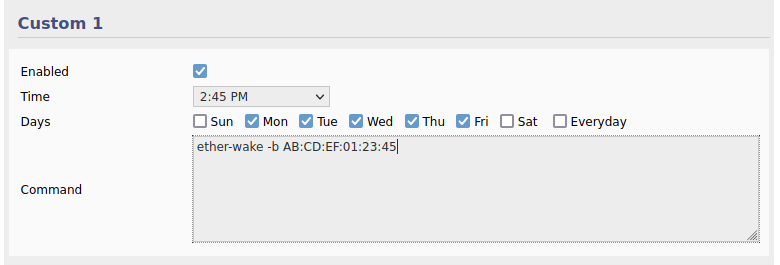User Tools
Sidebar
Schedule Tomato To "Wake Up" Network Devices
FreshTomato includes a Wake-on-LAN (WoL) function under the Tools menu. While useful, this function must be performed manually every time you wish to wake a device. Instead, waking devices can be performed automatically using the Scheduler function.
Automating the process using the Scheduler has two main advantages:
- First, waking many devices on a network with many clients using the Wake-On-LAN menu would be tedious and time-consuming.
Doing the same in a script makes the process much more manageable. - Second, the Scheduler allows you to wake devices automatically. You don't need to remember to do anything, as long as
the Scheduler is functioning. The ether-wake command will do everything without your attention.
Here are the available parameters for ether-wake:
Usage: ether-wake [-b] [-i IFACE] [-p aa:bb:cc:dd[:ee:ff]/a.b.c.d] MAC Send a magic packet to wake up sleeping machines. MAC must be a station address (00:11:22:33:44:55) or a hostname with a known 'ethers' entry. -b Broadcast the packet -i IFACE Interface to use (default eth0) -p PASSWORD Append four or six byte PASSWORD to the packet
For example, this sends a Wake-on-LAN signal to a LAN device with a MAC address of AB:CD:EF:01:23:45 every weekday at 2:45 PM:
- Go to the Scheduler menu.
- Scroll to the Custom field of your choice (in our example, Custom 1).
- Check the corresponding Enabled setting.
- In the Time menu, select 2:45 PM.
- Enable the checkboxes for Monday through Friday.
Notes and Troubleshooting
For a PC to wake up from a WoL packet, it must have its WoL firmware setting enabled. Before testing scheduled WoL events in FreshTomato, ensure your PC has the appropriate UEFI/BIOS setting enabled to recognize Wake-on-LAN packets.
Most UEFI/BIOS interfaces will have a Wake-On-LAN option named similar to:
- Asus BIOS/UEFI - “Power on by PCI-E or PCI”
- AWARD BIOS - “PME Event Wakeup”
- AMI BIOS - “Power on by PCI devices”
WoL settings in the PC's operating system also must be enabled. For Details, see: HOWTO Geek: What is Wake-on-LAN and How do I Enable it?
WoL functions generally assume a client PC/device starts from a powered off state. If your device is in suspend or sleep state, it may not recognize the wake signal and may not wake. Details for Windows can be found MS Docs: Wake on LAN (WOL) behavior in Windows 10.

